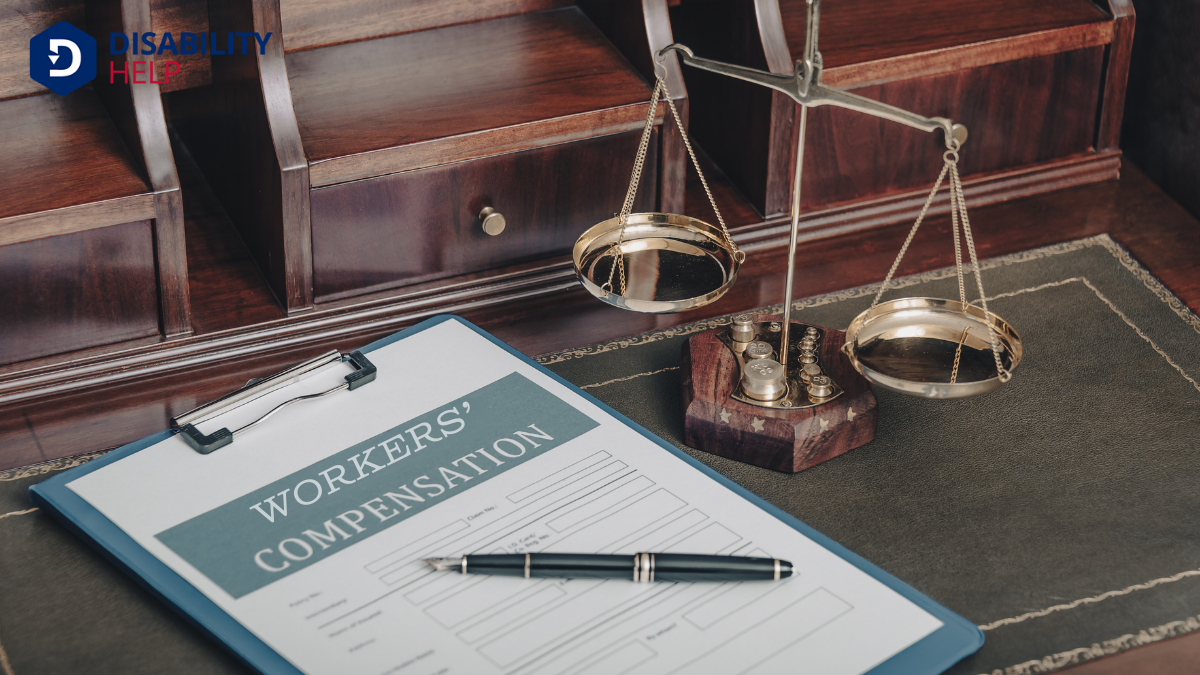In New Hampshire, workers' compensation helps us if we're injured on the job by covering medical expenses and a portion of lost wages. To qualify, we need to be employees and report injuries promptly. Our employers must maintain adequate insurance, ensuring we're protected. We should inform our supervisors immediately and complete the necessary claim forms to get the benefits. The program also supports us with rehab services if needed. If disputes arise, structured resolution processes, including appeals, are in place. For anyone traversing the complexities of the system, understanding these procedures is key to making the most of our rights.
Key Takeaways
- New Hampshire mandates employers to maintain workers' compensation insurance for all employees, covering medical expenses and partial wage replacement.
- Employees must report workplace injuries to their employer immediately to initiate the workers' compensation claim process.
- Injured workers receive medical care coverage, including doctor visits, surgeries, therapy, and medications.
- Wage replacement benefits typically cover 60% of average weekly wages, starting after a three-day waiting period.
- Disputes can be resolved through informal discussions, mediation, or formal appeals with the Compensation Appeals Board.
Eligibility for Workers' Compensation
When it comes to figuring out if someone's eligible for workers' compensation in New Hampshire, we've got to take into account a few key criteria.
First, we need to establish whether the person is an employee. Independent contractors typically aren't covered, so understanding the employment status is essential.
Next, we must confirm that the injury or illness happened while performing job-related duties. This means the injury should've occurred on the job or while carrying out tasks on behalf of the employer.
In addition, the job site and conditions should be safe and compliant with safety regulations. If an employee gets injured because of unsafe conditions, it strengthens their eligibility claim.
We also have to examine if the employee notified their employer promptly after the injury. New Hampshire law requires timely reporting to guarantee proper documentation and response.
Finally, the employer must have workers' compensation insurance, which is generally mandatory for most businesses in New Hampshire. Without this insurance, the path to compensation becomes less straightforward.
Filing a Workers' Compensation Claim

Understanding eligibility lays the groundwork for the next step: filing a workers' compensation claim in New Hampshire.
We understand this process might seem intimidating, but breaking it down into manageable steps can make it easier.
Once we've confirmed eligibility, it's essential to act promptly. Let's walk through the important steps together:
- Report the Injury: Notify your employer immediately after the injury occurs. Timeliness is essential—waiting too long might jeopardize our claim. This notification should be in writing, ensuring there's a record.
- Seek Medical Attention: Our health is the top priority. Visit a healthcare professional to assess and document the injury. This medical record will be a critical part of our claim.
- Complete the Claim Form: Fill out the necessary workers' compensation claim form, which is available from our employer or the New Hampshire Department of Labor. Accuracy is key; double-check for any errors.
- Submit the Claim: After completing the form, submit it to our employer promptly. They'll forward it to their insurance carrier.
Employer Responsibilities and Requirements
As employers, we've specific responsibilities and requirements when it comes to workers' compensation in New Hampshire.
We must guarantee coverage obligations are met, report any workplace injuries promptly, and maintain accurate records to stay compliant.
Let's explore these key duties to better understand our role in supporting our employees.
Coverage Obligations Overview
Employers in New Hampshire have specific responsibilities when it comes to workers' compensation coverage. We must guarantee that we're providing protection for our employees in case they get injured on the job. This isn't only about compliance but also about showing our employees that we care about their well-being.
Understanding these obligations can sometimes feel overwhelming, but it's important to break them down into clear steps.
Here are four key responsibilities we must fulfill:
- Coverage Requirement: We're required to have workers' compensation insurance if we employ even one person, whether full-time, part-time, or seasonal. This guarantees our employees are covered for work-related injuries or illnesses.
- Choosing the Right Policy: It's vital to select a policy that fits our business needs and provides adequate coverage. We should work with a trusted insurance provider to make informed decisions.
- Posting Notices: We need to display notices in the workplace, informing employees about their rights and how to report injuries.
- Financial Accountability: We're responsible for paying premiums on time to maintain coverage, thereby avoiding costly penalties or legal issues.
Reporting Injury Procedures
Prompt and accurate reporting of workplace injuries is vital for adhering to our responsibilities as employers in New Hampshire. When an employee gets injured, we must act swiftly to guarantee they receive the necessary support and care. The first step is notifying the injured worker's immediate supervisor as soon as possible. This allows us to assess the situation and provide immediate aid if needed.
Next, we're required to complete a "First Report of Injury" form. This form should be filled out within five days of the injury being reported to us. It includes details about the injury, how it happened, and any initial medical treatment provided. Submitting this form promptly helps initiate the workers' compensation process and informs our insurance carrier of the incident.
Additionally, maintaining open communication with the injured employee is essential. We should keep them informed about their rights and the steps being taken to guarantee their well-being. This transparency not only aids their recovery but also builds trust within our organization.
Recordkeeping and Compliance
Maintaining accurate records of workplace injuries isn't just a regulatory obligation; it's a cornerstone of effective workers' compensation management in New Hampshire. As employers, we bear the responsibility of guaranteeing compliance with state laws, which helps us protect our workforce and business.
Here's why meticulous recordkeeping matters:
- Legal Protection: Accurate records shield us from potential legal challenges by demonstrating due diligence and compliance with state regulations.
- Financial Control: Keeping detailed records helps control costs by guaranteeing claims are legitimate and processed efficiently, minimizing unnecessary financial burdens.
- Workplace SafetyThe policies and practices in place to ensure the physical and mental well-being of all employees, i...: Analyzing injury patterns allows us to identify hazards and implement preventative measures, fostering a safer work environment.
- Employee Trust: Transparent processes and records reassure employees that their well-being is prioritized, enhancing morale and trust.
To comply with New Hampshire's requirements, we must maintain records of all workplace injuries, including the date, time, nature of the injury, and any medical treatment provided.
This data isn't merely for compliance; it's a valuable tool for improving workplace safety.
Let's embrace this responsibility, safeguard our employees, and guarantee our business thrives by adhering to these recordkeeping practices.
Together, we can create a safer, more accountable workplace.
Types of Compensable Injuries
In New Hampshire, understanding the types of compensable injuries is vital for managing workers' compensation claims effectively. As employers or employees, knowing what qualifies can help us navigate the claims process with confidence.
Generally, compensable injuries are those that occur in the scope of employment and are directly related to work duties. This includes injuries from accidents, such as slips, trips, and falls, or machinery malfunctions.
We should also be aware that repetitive stress injuries, like carpal tunnel syndromeA condition causing numbness, tingling, or weakness in the hand, due to pressure on the median nerve..., can qualify if they result from job-related activities over time. Illnesses caused by exposure to hazardous substances at work, such as respiratory issues or skin conditions, may also be compensable.
Mental health conditions are more complex; however, if they stem from a specific work-related event or ongoing job stress, they might be covered.
It's essential to document everything thoroughly. Accurate and timely reporting of an injury or illness can greatly impact the outcome of a claim.
If we're unsure whether an injury is compensable, consulting with a legal professional or the New Hampshire Department of Labor can provide further guidance. Understanding these nuances guarantees we're better prepared to handle workers' compensation matters effectively.
Benefits Provided to Employees

When we look at the benefits provided to employees under workers' compensation in New Hampshire, we see a thorough support system.
Medical expense coverage guarantees that employees aren't burdened with the cost of treatment, while wage replacement benefits help maintain financial stability during recovery.
Additionally, rehabilitationThe process of helping individuals with disabilities achieve and maintain their optimal physical, se... support services aid in returning to work effectively and safely.
Medical Expenses Coverage
How do we guarantee that employees receive the medical care they need after a work-related injuryAn injury that occurs in the course of employment, potentially leading to temporary or permanent dis...? In New Hampshire, workers' compensation guarantees that employees don't have to worry about medical expenses while recovering. This coverage is extensive and designed to address the immediate and long-term healthcare needs resulting from workplace incidents.
Let's explore what medical expense coverage means for us:
- Peace of Mind: Employees can focus on healing without the stress of medical bills. Knowing that their employer-provided insurance will cover necessary treatments brings relief during a difficult time.
- Access to Care: From doctor's visits and hospital stays to surgeries and physical therapy, workers' compensation covers a broad range of medical services. This means employees have access to all the care they might need.
- Prompt Treatment: Quick access to medical treatment is essential for recovery. Workers' compensation guarantees employees receive timely care, potentially reducing the severity of their injuries.
- Continuous Support: The coverage doesn't stop at initial treatment. It extends to ongoing care, including medications and specialist visits, to guarantee a full recovery.
Wage Replacement Benefits
Although medical expenses are an essential component of workers' compensation, wage replacement benefits play an equally important role in supporting injured employees in New Hampshire. When we're unable to work due to a workplace injury, these benefits help guarantee that we can still manage our financial obligations.
In New Hampshire, workers' compensation provides wage replacement that typically covers a percentage of our average weekly wages. Understanding how these benefits work can make a big difference during recovery. The compensation usually covers about 60% of our average weekly wages, up to a state-defined maximum.
This financial support kicks in after a waiting period of three days, though if the injury leads to more than 14 days of disability, those initial three days might be compensated retroactively.
It's essential for us to promptly report any workplace injuries to our employers to begin the claims process, Which can help guarantee that we receive these vital benefits as soon as possible. Communication with our employers and healthcare providers is key to smooth processing.
While the benefits won't replace our full income, they do provide significant support, allowing us to focus on recovery without financial strain.
Rehabilitation Support Services
Rehabilitation support services are another essential component of workers' compensation in New Hampshire, providing aid beyond just wage replacement. They play a significant role in helping injured employees regain their independence and return to work as soon as possible.
When we're faced with the challenges of recovery, these services can make a world of difference. Let's explore how they can impact our journey to recovery:
- Physical Therapy and Occupational Therapy: These therapies help us rebuild strength and improve our ability to perform daily tasks and job-related activities. They're imperative for regaining confidence in our physical abilities.
- Vocational RehabilitationServices that help individuals with disabilities prepare for, obtain, and maintain employment.: If our injury prevents us from returning to our previous job, vocational rehabilitation services assist in finding new employment opportunities. This might include job placement servicesServices that help individuals with disabilities find suitable employment, often provided by nonprof..., training, or even education.
- Psychological Support: Dealing with an injury can be mentally taxing. Access to counseling servicesProfessional guidance to help individuals cope with emotional, mental, or social challenges. can provide much-needed emotional support, helping us cope with the stress and anxiety that often accompany workplace injuries.
- Assistive Devices: Sometimes, we need equipment like prostheticsArtificial devices that replace missing body parts, such as limbs, often used after amputations. or wheelchairs to help us adaptA grassroots disability rights organization in the U.S. that focuses on promoting community-based se... to new physical limitations. Workers' compensation may cover these costs, ensuring we're not burdened financially during our recovery.
Understanding these services helps us navigate the path to recovery with confidence and hope.
Dispute Resolution Process
Steering the dispute resolution process in New Hampshire's workers' compensation system can feel challenging, but we're here to break it down.
When disagreements arise over claims, the system provides structured steps to resolve them. Initially, we should attempt informal discussions with the insurance adjuster or employer. Effective communication can often clear up misunderstandings and lead to a resolution.
If informal talks don't work, we can file a formal petition for a hearing with the New Hampshire Department of Labor. Once submitted, our case will be assigned to a mediator.
Mediation offers a chance to negotiate with the other party in a more structured environment. It's a voluntary process where we can reach an agreement without going to a formal hearing.
Should mediation not yield results, a hearing is scheduled. During this hearing, both sides present their evidence and arguments before a hearing officer. The officer then issues a decision based on the facts presented.
If we're unsatisfied with this decision, we can appeal to the Compensation Appeals Board.
Understanding each step helps us navigate disputes effectively, ensuring our rights are protected and our concerns addressed within the workers' compensation framework.
Impact of Pre-existing Conditions
When dealing with workers' compensation claims in New Hampshire, pre-existing conditions can considerably influence the outcome.
It's essential to understand how these conditions might affect our claims. First, let's remember that a pre-existing condition doesn't automatically disqualify us from compensation. Instead, the key question is whether the work-related injury aggravated the condition.
To navigate this complex landscape, we need to keep several points in mind:
- Documentation is Key: Thorough medical records can demonstrate how a work-related incident worsened a pre-existing condition. Without this evidence, proving our claim becomes challenging.
- Honesty Matters: We should always disclose any pre-existing conditions. Transparency helps build trust and strengthens our case, showing that we're not hiding anything.
- Causation is Essential: We must establish a clear link between the work-related injury and the aggravation of the condition. This connection can make or break our claim.
- Seek Professional Guidance: Consulting with a healthcare provider and possibly a legal expert can help us navigate the intricacies of workers' compensation claims involving pre-existing conditions.
Understanding these factors helps us approach our claims with confidence, ensuring we're prepared for any challenges that might arise.
Legal Rights and Protections

Maneuvering the complex world of workers' compensation in New Hampshire requires a solid grasp of our legal rights and protections. We, as workers, are entitled to certain benefits if we suffer a work-related injury or illness.
It's essential to know that we're protected from employer retaliation when we file a claim. Our right to seek compensation is legally safeguarded, guaranteeing that we can pursue what we're entitled to without fear.
In New Hampshire, the law mandates that employers carry workers' compensation insurance, which covers medical expenses and a portion of lost wages. We should report any injury to our employer as soon as possible, as this initiates the claim process.
Knowing the timelines is key; generally, we must notify our employer within two years from the date of injury.
If our claim is denied, we have the right to appeal. Understanding the appeals process can empower us to fight for our benefits. We might also seek legal representationThe way people with disabilities are depicted in media, culture, and politics, often influencing pub... to navigate these challenges.
Being informed about our rights and protections not only supports our recovery but also guarantees we're treated fairly throughout the workers' compensation process.
Conclusion
In summary, we've taken a closer look at how New Hampshire's workers' compensation system operates. From understanding eligibility and filing claims to knowing employer responsibilities and types of compensable injuries, it's clear that protecting workers is a priority. The benefits provided aim to support employees during their recovery, while the dispute resolution process guarantees fair treatment. Let's remember that our legal rights and protections are there to safeguard us, even when pre-existing conditions come into play.






